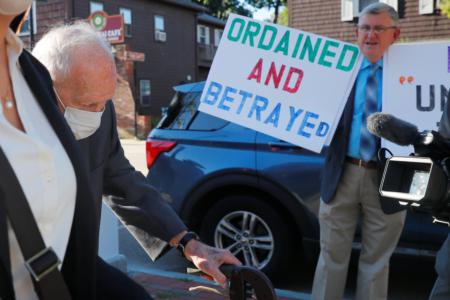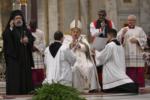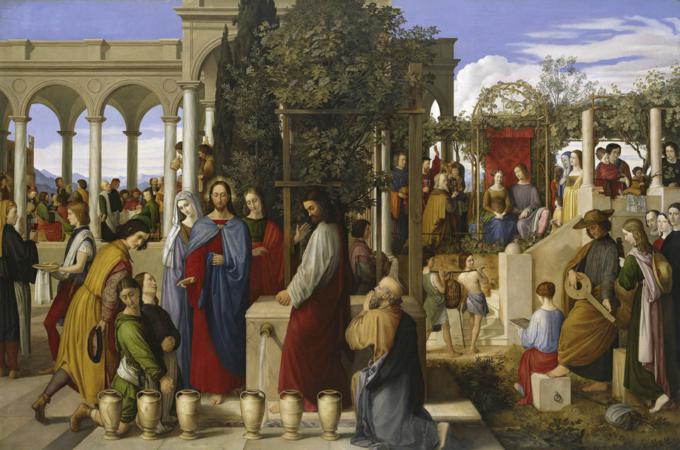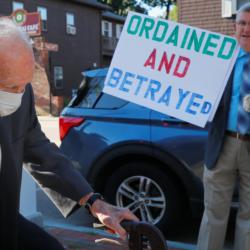The Lord's first almsgiving
Lent, we are aware, is a season of intense penance. "The interior penance of the Christian," the Catechism teaches, "can be expressed in many and various ways. Scripture and the Fathers insist above all on three forms, fasting, prayer, and almsgiving, which express conversion in relation to oneself, to God, and to others." (n. 1434).
I want to propose to you a type of almsgiving which, I think, has much application throughout the year, besides Lent. It is illustrated in Our Lord's first public miracle, at the wedding feast of Cana. You know the story: the couple has run out of wine; Mary brings it to attention of her Son; he at first seems to rebuff her; but she nonetheless tells the servants to follow his instructions. He has them fill up some large stone jars with water, which, when they draw some out, has turned into the finest wine.
I want you to think about Mary's simple remark, "They have no more wine." Ask yourself: why did they run out of wine? It's very strange. They are holding a very big feast: the newly created wine is the equivalent of 800 bottles, enough for over a thousand persons. But they ran out of wine. Why?
Let's allow ourselves to imagine. They may have been defrauded by the supplier. Someone might have forgotten to order it, or made a mistake in the quantity. Maybe there was an accident in its delivery. Maybe some powerful person came to the area, he ordered lots of wine at a higher price, and it was felt that the available wine had to go to him.
Or maybe, most outrageously, the couple was more generous than their means afforded, and they invited "too many" people to the feast, for what they could afford to spend on it. Maybe in their simplicity and idealism they just trusted that it would work out somehow.
I favor this last supposition, because I love to think of them as inspired just to cast the dice with an almost reckless abandonment, throwing caution to the wind, risking ridicule and collapse, and saying to themselves, "God will provide!"
And then (it was all arranged by providence) as if to honor their faith, God shows up at their wedding reception, to provide!
I love this idea, too, because on this outrageous speculation, in God's providence, Mary ends up being there precisely to take care of them, as a mother.
Whatever the reason, here's the next thing to note: no one says, "Is it their fault that they ran out of wine? Because, if it is, then maybe they should suffer the consequences." Or, "There could very well be a 'moral hazard' if we were to bail out all newlyweds who planned so poorly." No one raises such questions -- not Mary, not Jesus, not the disciples.
And this observation leads to a lesson about almsgiving. In the Catholic Church, we rightly speak of a "preferential option for the poor." Typically and most clearly, charitable giving is shown in the relief of the suffering of the "least of his brethren," like those helped by Catholic Relief Services, or unwed moms, or orphan children who sell their bodies. Indeed, in the Gospel of John, most of the time our Lord is dealing with the poor like that -- the man born blind; the man paralyzed for so many years and unable to get into the pool; even Lazarus, a simple man from a humble home.
And yet, Our Lord's very first miracle is not to relieve the needs of the poorest of the poor, but to help out newlyweds.
What type of almsgiving is this, precisely? Let me suggest some analogues today.
-- The couple you know who got married despite a huge nut of college debt to crack. And she's pregnant already.
-- The couple with three small children, she's expecting a fourth, and they cannot afford a minivan.
-- The family with tuition bills for Catholic schools.
How about:
-- The couple with five kids celebrating their 10th wedding anniversary who aren't even able to afford -- they believe they cannot be so selfish as to afford -- an evening out for a nice dinner and an elegant hotel room?
I could go on and on. Don't raise the question, "Why are they out of wine?" I had a colleague once with eight children, and when he was complaining that he needed a raise, "I've got eight children!" another colleague quipped, crassly, "And whose fault is that?" If we make ourselves that crass person, we are not in the company of Mary, her Son, and his Disciples.
On the other hand, the "couple from the wedding feast" is not going to come around and tell you about their needs. They didn't go from table to table at Cana asking if anyone could help out with the wine. Probably, of the hundreds of guests at the wedding, just two noticed that they were out of wine, the one who said it, and the One to whom she said it.
Charity begins at home. Mary can help us to see, "they have no more wine." Let's ask her, "Mary, show me the wedding couple at Cana right now in my life who has run out of wine, so that I can help."
This is almsgiving too, the very first John tells us about.
MICHAEL PAKALUK'S BOOK ON THE GOSPEL OF JOHN HAS JUST BEEN PUBLISHED BY REGNERY, "MARY'S VOICE IN THE GOSPEL ACCORDING TO JOHN." THIS ESSAY IS ADAPTED FROM AN ADDRESS TO THE BOSTON CHAPTER OF LEGATUS EARLIER THIS MONTH.
- Michael Pakaluk, an Aristotle scholar and Ordinarius of the Pontifical Academy of St. Thomas Aquinas, is a professor in the Busch School of Business at the Catholic University of America. He lives in Hyattsville, MD, with his wife Catherine, also a professor at the Busch School, and their eight children. His latest book, on the Gospel of Mark, is "The Memoirs of St Peter." His next book,"Mary's Voice in the Gospel of John," is forthcoming from Regnery Gateway.



















